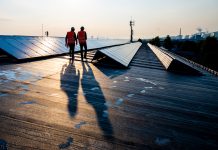
Karmenu Vella, European Commissioner for Environment, Maritime Affairs and Fisheries examines ocean and climate change and argues that now is the time for a new wave of energy
With Summer 2018 beating all weather records across Europe, the topic of global warming is on the minds of many. Extreme temperature spikes, droughts, wildfires and storms. Decades of anthropogenic greenhouse gases emissions are taking their toll. And while the impact on our crops, forests and cities is immediately felt, much of the global warming effects take place below the horizon, literally and figuratively. They are in our ocean.
For about half a century, the ocean has shielded humans from even more rapid climate change, by storing most of the excess heat and CO2 created by our fossil fuel addicted society. Thirty percent of carbon dioxide from human activity dissolves in the ocean; 90% of the extra heat is absorbed. But despite its strength and resilience, the ocean is about to give in. Ocean temperatures are rising, in turn, leading to sea level rise, deoxygenation and drastically changing climate patterns – the predicted effects of which are highly disquieting.
The absorption of CO2 provokes ocean acidification, which can ultimately affect the entire food chain. Our planet is not just warming, it is suffering from a high and persistent fever. We have to act now, starting with our energy supply and consumption.
While a victim of climate change, the ocean may also hold part of the solution. The idea of using tidal energy dates back to as early as the sixth century and is finally getting traction: waves, currents, differences in temperature or salinity. The potential for energy generation is enormous and all these options need to be exhausted in our quest for low-carbon power.
Europe is leading the way. The world’s first tidal power station, built in 1966, was located in Brittany, France.
The world’s first commercial wave power device was installed in Scotland (2000), the first wave farm in Portugal (2008). Today, Europe holds two-thirds of the companies, test centres and installed capacities in ocean energy. The sector accounts for 2,000 high skilled jobs – 70% of them in cutting-edge research and development.
Over the last 10 years, around €3 billion has been invested in ocean energy in Europe, most of it from private funds. But the sector is scarcely out of the egg and needs the strong support from public authorities to mature. The European Commission, together with the Member States, can make a difference.
European funds are allowing regions to invest in technological developments, test centres, supply chain and port infrastructure. Since 2014, we have spent €124 million on 17 R&D projects, generating total research investment of some €270 million. Through the InnovFin Energy Demo Projects, ocean energy developers can benefit from long-term guaranteed loans from the European Investment Bank. And with our innovative BlueInvest matchmaking events, we establish new networks between blue economy entrepreneurs and potential investors. Our May edition has facilitated more than 1,200 business contacts, many of them leading to new and promising opportunities.
But the success of ocean energy does not depend on access to finance alone. We also need to put in place the right regulatory conditions, at European, national and local level. This includes good maritime spatial planning, which can increase public acceptance and helps to avoid possible conflicts at sea – for example, between fishing vessels and ocean energy developers. It also includes effective consenting and licensing procedures at the national level. And it requires more information on how ocean energy plants interact with marine life.
These are uncharted waters, which is why the European Commission is supporting projects on the environmental monitoring of wave and tidal devices. These projects will allow policymakers across the European Union to assess the technologies’ environmental impacts and provide appropriate guidance. For project developers and investors, this will significantly reduce environmental risks.
I am aware that ocean energy is not an obvious or easy choice. Start-up costs are high, technology not always sufficiently advanced. The harsh conditions at sea make everything complex and expensive. But in the long run, energy from the sea is more productive and more predictable than other renewable energy sources. Europe has the technology, the skilled workforce and the environmental conditions to make this work. We can turn this into an opportunity for sustainable growth. Also: we have no other choice. Our transformation towards a low-carbon society requires us to use all renewable energy sources at hand. Ocean energy will be, and already is, part of our green, blue future.
Karmenu Vella
Commissioner for Environment, Maritime Affairs and Fisheries
European Commission
Tel: +32 2 299 96 96










